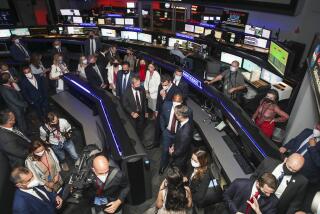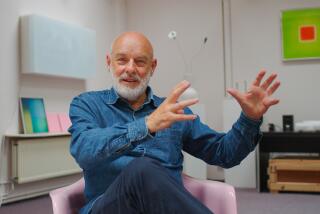David Hamburg / On Science : Carnegie Corp. Head Urges ‘Credible Synthesis’: Science, Technology, People
- Share via
NEW YORK — Carnegie Corp. President Dr. David A. Hamburg was asked to pick a catchy title for his commencement address today at Pasadena’s California Institute of Technology. Though he is a psychiatrist, not a vintner, he decided the graduates of the school where he once spent a “glorious year” as a Fairchild Scholar might like to hear about “New Wine in Old Bottles.”
Sipping black coffee at brunch here Sunday, Hamburg, 61, explained that the “new wine” represents a massive “world transformation, driven by science and technology.” As for the old bottles, Hamburg chose that image to reflect the outdated attitudes and rigid bureaucracies that sometimes thwart change.
Science Not a Separate Reality
Tall, slender, with wavy gray hair and a face that crinkles into generous smiles at the whisper of a new idea, Hamburg would like most of all to smash those old bottles and serve up the new wine. “Science and science-based technologies have become a pervasive part of human experience in the 20th Century and the key to future well-being,” he said. “Science is not a separate activity, remote from the lives of people--however arcane it may be.”
With innovation occurring at a psyche-spinning pace, science, technology and America’s university systems have entered into an occasionally uncomfortable menage a trois, Hamburg maintains. Their offspring are microchips, superconductors, biogenetic breakthroughs and an overdose of other developments that send most mortals into informational catatonia.
“How to assess and use wisely these technical innovations,” Hamburg said in slow, thoughtful tones. “That seems to me the proper mandate for the university in the 21st Century.”
Focusing on Human Behavior
At Stanford, Harvard, in top posts at a series of prestigious scientific organizations and now at the Carnegie Corp., Hamburg has focused his attention on human behavior. His constant theme has been integration of interdisciplinary fields of knowledge: pulling together the best of medicine, technology, genetics, biology, chemistry, sociology, psychology, anthropology--even encouraging English departments to speak to physics departments.
‘Broad Basis of Inquiry’
“In any field of inquiry, I feel you have to build in a very broad basis of inquiry,” he said. As if he were discussing his favorite California Cabernet, Hamburg added, “It makes for a kind of ferment of ideas.”
Early on, he established as “my particular mission” a determination to bring a strong scientific basis to psychiatry. Green out of medical school at Indiana University in 1947, he joined with a handful of what proved to be psychiatric pioneers in studying the effects of stress on men who had fought in World War II. Hamburg became especially interested in observing mechanisms of coping and adaptation: how humans deal with personal and external trauma, why they behave the way they do. Looking now at a technical revolution that “shows no signs of stopping,” his main concern is how people will adapt to the enormous changes wrought by technological innovations.
For scientists, the “virtually unprecedented” responsibility accompanying these changes is well reflected in Hamburg’s chosen field of medicine, the scientist said. “It’s wonderful that we can keep people alive for so long. But on the other hand, there is a whole range of medical problems associated with that.” Every major scientific advance brings side effects, he continued, “developments that are not envisioned, sometimes not even wanted. And sometimes we are very ambivalent about this.”
In calling for the “judicious use of science and technology for humane purposes,” he cited, also, the “obvious ultimate case” of nuclear weapons. He snorted as he likened the concept of “limited nuclear war” to “hot snow,” and called for a “generic prescription--one we’re pursuing like gangbusters” at the Carnegie Corp.--offering “constraints” for nuclear weapons.
For the world’s “putative grown-ups,” he suggested, nuclear weapons are the scariest toys in a deadly toy chest. But technology and fast-paced life have assured that younger people have their own selection of lethal attractions. At the Carnegie Corp., Hamburg broke precedent when he established a Council on Adolescence, charged with exploring the issues of future adults.
“Now you have the kids of 9, 10, 11 who have easy access, in beaucoup quantity, to all kinds of dangerous substances, vehicles, activities,” Hamburg said. As one way to “get the facts straight and meaningfully to these young people, at an early age,” he advocates adapting the immensely popular human biology program he helped devise at Stanford. Following his own belief that “it’s got to be OK to a degree to combine entertainment and education,” Hamburg sees videocassettes as the ideal medium for late-elementary-school children to learn about the dynamics of the human body.
Happily Ever After?
His concern is to apply science to real life, to allow technology and human beings to live, ideally, happily ever after. “In my view,” he said, “there are a lot of brilliant, what should I say, closet applied scholars” in America’s universities. He is striving, Hamburg said, to bring those often-cloistered individuals into the mainstream, “to help build strength in universities on important social issues.”
While stressing the need to meld different fields of study, Hamburg shies away from calling for some sort of scientific generalism.
“In any organization you need a mix of generalists and specialists,” he said. “You’ve got the generalists ranging across different disciplines, striving, always unsuccessfully, to get the whole picture.”
It’s a lovely scenario of scientific curiosity, he added, “but the danger of too much generalism is that you get too much superficial thinking.”
Another of his concerns is that rapidly changing technology both “puts a demand on social institutions to avoid scientific illiteracy” and fosters a fear of technology that may result in that same kind of illiteracy.
“Part of the answer, almost the easier part, is to open up pathways to careers based on science and technology,” Hamburg said. “Here the real issue is to open this path to women and disadvantaged minorities.
The Broader Challenge
“That’s one kind of challenge, and it’s a formidable one,” he said. “The broader one is how to avoid being excluded in issues that have scientific significance, how to accept the practical significance, how to build a base early on so that you are not intimidated by science.
“The other thing is to have a system such that throughout life, individuals are more likely to know where to go to get information” about science and technology.
But Hamburg is optimistic: “My hunch is that in the next five to 10 years you are going to see a great surge in this country in trying to understand these problems. I sense a much more open-minded searching and groping for knowledge going on.”
Foundations, such as his own Carnegie Corp. (where Hamburg last year oversaw the distribution of nearly $30 million in grants), can play an important role in the battle against scientific illiteracy, he said. “There have got to be some institutions in society that hold our feet to the fire.”
In fact, when he took over the helm of the Carnegie Corp. 4 1/2 years ago, Hamburg recalled announcing that “our job is to tackle intractable issues.
“That’s exaggerating somewhat,” he said. “But not much.”
Keeps ‘Stirring the Pot’
Hamburg stressed the special position of privately endowed foundations that can operate in areas government may prefer to avoid. “What I do best,” he said, “is to keep stirring the pot within the foundation world.”
His job now has special privileges, Hamburg said, and he relishes them. “I think I would like to be able to use this window,” he said. “I have a very broad view, and I want to be able to encourage the best work being done on any subject,” and later, “to tie that work together for a wider audience.”
In coming years, he hopes for “an intelligible and credible synthesis” of science, technology and the world: “You need some sort of a constituency for curiosity about the world we live in.”






